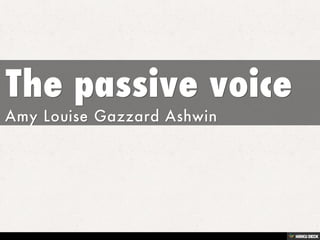Report
Share
Download to read offline

Recommended
More Related Content
What's hot
What's hot (20)
General english - presentation past tense - simple and continuous

General english - presentation past tense - simple and continuous
Similar to The passive voice
Similar to The passive voice (20)
The passive voice
- 1. The passive voice Amy Louise Gazzard Ashwin
- 2. Uses of the Passive voice • When the speaker is unknown • When the speaker is irrelevant • When you talk about a general truth • When we say what happens to the subject
- 3. Form of the passive. General rule. • It is formed with ''be''+''past participle''.
- 4. Examples • Present simple: read/s...is/are read. • Past simple: wrote...was/were written. • Present Perfect: Has eaten...has been eaten. • Past perfect: Had drunk...had been drunk.
- 5. Examples • Going to: Is going to cook...is going to be cooked. • Modal verb: Must do... must be done. • Future will: Will make... will be made.
- 6. Active to passive • Active voice: The subject does the action. • Passive voice: The subject receives the action. • Example: Rebecca(subject) makes a cake. • Example: A cake is made by Rebecca(subject).
- 7. Active to passive sentences • A: People invite me to parties. • P: I'm invited to parties • A:My sister is using the computer at the moment. • P: The computer is being used by mi sister at the moment.
- 8. Active to passive sentences • A: The boys played with the bricks. • P: The bricks were played with by the boys. • A:My sister broke my English book. • P: My English book was broken by my sister.
- 9. Active to passive sentences • A: The mechanic has repaired my car. • P: My car has been repaired by the mechanic.